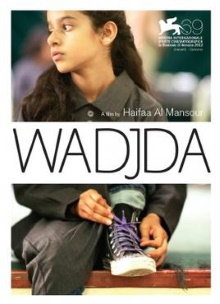This is the first Saudi Arabian film to be featured here and the very first Saudi Arabian film to be made by a female director, Haifaa al-Mansour. Though as the director herself notes, there’s not much competition as the country had no movie theatres until 2018 and consequently not much of a film industry. Nevertheless this film is as good as the best from elsewhere in the world and successfully highlights how the kingdom is one of the worst places in the world to be born as a woman yet takes a balanced enough approach that the women are able to survive and find their happiness in all manner of small ways, and that in turn, makes this a highly entertaining film.
10-year-old girl Wadjda lives in the city and her dream is to own a bicycle of her very own despite being repeatedly told that they are not for girls. A neighbor boy Abdullah with a bicycle likes to tease her and she boasts that one day she will outrace him on her own bike. Unfortunately the bicycle that she has her eye on costs too much and her mother refuses to buy one for her. When her school announces that the prize money for an upcoming Quranic recital competition will more than cover the cost of the bicycle, she eagerly signs up despite not being particularly pious before this. Meanwhile her mother has problems of her own including the fact that she has to put up with an unreliable driver for her commute to work and that Wadjda’s father is rarely home and may be looking for a second wife as she is unable to bear him a son.
This is a simple premise that is reminiscent of many other films and I’m a little leery of a simple bicycle being such an object of desire for what looks like a relatively well-off household in a fairly rich country. Still there is no doubt it works very well as an entryway into the workings of Saudi society and how it systematically degrades the value of women at every level. Even if one has already read up on the topic, this film documents the inequality so exhaustively that it’s still quite an eye-opener. One of the most powerful expressions of this is how utterly helpless Wadjda’s mother is against the indifferent service of the male driver she must employ just to get work. If the driver doesn’t want to come to work, there is simply nothing she can do about it. When Wadjda tries to intervene, she luckily has Abdullah with her and the little boy is able to scare the driver into cooperating by threatening to expose his illegal residence status as he is apparently not a Saudi. This little episode succinctly shows the reality of immigrant labor in the kingdom while also demonstrating how much more weight the word of a little boy carries compared to that of an adult woman.
Another remarkable aspect of this film is that it show how the apparatus for the oppression of women is largely enforced by women themselves. The headmistress at Wadjda’s school as you might expect imposes strict discipline and berates students if they even allow themselves to be seen by the male construction workers working on the roof of a building next door. But then we also see that her mother, who is more reasonable, has standards of her own. When a friend introduces her to a job at a hospital located nearer to her house, she is alarmed when she sees that her friend’s face is uncovered in public as the hospital seems to be a more permissive environment and so turns down the job. Of course they are just responding to the norms imposed by men and it is remarkable how absent Wadjda’s father is. From this, we can see for ourselves without needing to be explicitly told how much freedom the men in Saudi Arabia enjoy, being able to move around at will and even move between families as the fancy takes them, while the women are confined to strictly defined spaces and roles.
On top of this rich and powerful dissection of Saudi Arabian society, this film features solid performances and likable characters. You can even detect the dual-edged ambivalence in the relationship between Wadjda and Abdullah. While it’s sweet to note how much Abdullah seems to like Wadjda, we can also see that how easily it could all turn against her if he changes his mind and that is very scary. That’s why this is a fantastic film and a very impressive debut work on the part of its director. I do note that she now lives in the US because, of course, what woman would voluntarily choose to live in Saudi Arabia if she has the choice?
